Dyslexia, Dyscalculia and Dysgraphia – Mary Asper
Dyslexia, Dysgraphia or Dyscalculia are among the most complicated learning disorders seen in education today. Many of these students struggle to complete academic tasks, maintain social relationships with peers and adults, and are constantly under stress.
In this recording, you will learn how underlying deficits related to executive function, visual-perceptual and visual-motor skills, and auditory processing skills affect a student’s ability to read and write at grade and age appropriate levels. Participants will explore the impact visual processing, cognitive development and organization have on acquiring mathematic ability, and understand how to support and teach struggling math learners.
This presentation shows you how to identify underlying deficits and develop IEPs or 504 plans that effectively address individual student needs. You will develop a plan that includes game-based learning, assistive technology, phonemic and phonological awareness practice, focused auditory interventions and simple techniques to help with visual processing ability.
Upon completion of this program, you will be able to provide strategies to address your student’s/client’s:
- Visual perceptual skills
- Visual motor integration
- Auditory and visual memory
- Reading rate, accuracy, fluency, comprehension
- Phonetic awareness and memory
- Spelling and handwriting struggles
- Formulate and implement plans for comprehensive evaluation to identify diagnostic criteria and underlying deficits present in students with reading, written expression, or math learning difficulties.
- Develop IEPs or 504 plans that provide students with the instruction and support they need to be successful in reading, writing, math, listening comprehension, and oral expression.
- Choose student-centered accommodations based on recommendations of the International Dyslexia Association and Americans with Disabilities Act.
- Design effective strategies to treat underlying deficits in the areas of executive function visual processing, auditory processing, phonemic/phonological awareness, memory, and anxiety to improve reading, writing and math skills.
- Teach students self-advocacy and anxiety management skills related to classroom performance, meeting deadlines, and project completion.
- Utilize low-tech and high-tech assistive technology supports to help students access information through text, improve study skills, complete written assignments and help with math calculation.
Introduction
- Dyslexia, Dysgraphia and Dyscalculia
- Anxiety and stress: physical and emotional
- IEPs and 504’s
- Accommodations and supports
Evaluate and Assess For:
- Executive function
- Auditory Processing
- Visual Processing
- Phonemic Awareness
TREATMENT STRATEGIES:
Executive Function
- Typical Development
Sensory Development – Auditory Processing
- Typical Development
- Impact on Reading and Writing
- Auditory attention
- Focused listening
- Sound discrimination
Sensory Development – Vision
- Typical Development
- Impact on reading, writing and math
- Behavioral Optometry
- Visual attention
- Visual sequential memory
- Visual form constancy
- Using colored overlays
Phonemic/Phonological Awareness
- Typical Development
- Impact on reading and writing
- Effect on comprehension
- Sound/symbol correspondence
- Auditory bombardment
- Chunking and blending
- Whole-classroom activities
Anxiety
- Ability vs. Performance
- How to recognize anxiety in the classroom
- Planning and organizing to reduce anxiousness
- Creating opportunities for success in the classroom
- Peer support
- Self-advocacy
More Treatment Strategies for …
- Reading
- Written Expression
- Math Concepts and Calculation
Dyslexia, Dysgraphia and Dyscalculia in the Classroom
- When, why, and how to introduce Assistive Technology
- Hands-on activities
Case Studies/Experiential Group Activity
- Create an intervention plan for LD students
Instant Access Available
Downloadable Content

Get Instant Access Dyslexia, Dyscalculia and Dysgraphia – Mary Asper at Offimc.click Now!
Delivery Information
- Upon ordering the product, a delivery email with download instructions will be sent immediately to you so that you may download your files. If you log in (or create an account) prior to purchase you will also be able to access your downloads from your account dashboard.
- It is a digital download, so please download the order items and save them to your hard drive. In case the link is broken for any reason, please contact us and we will resend the new download link to you.
- If you don't receive the download link, please don’t worry about that. We will update and notify you as soon as possible from 8:00 AM – 8:00 PM (UTC+8).
- Please Contact Us if there are any further questions or concerns you may have. We are always happy to assist!



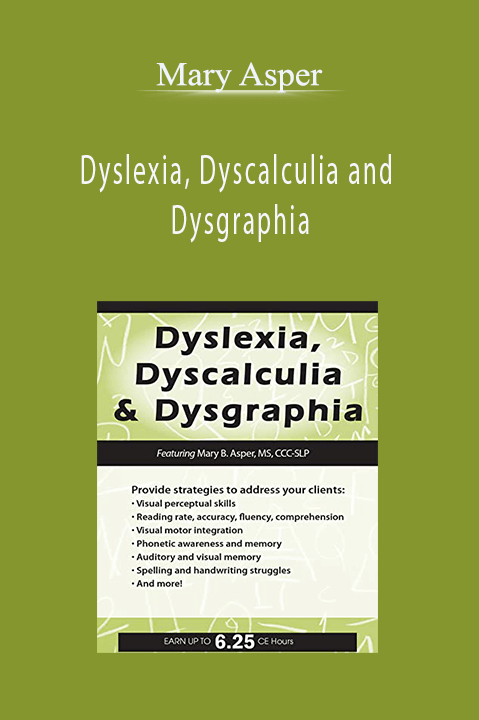
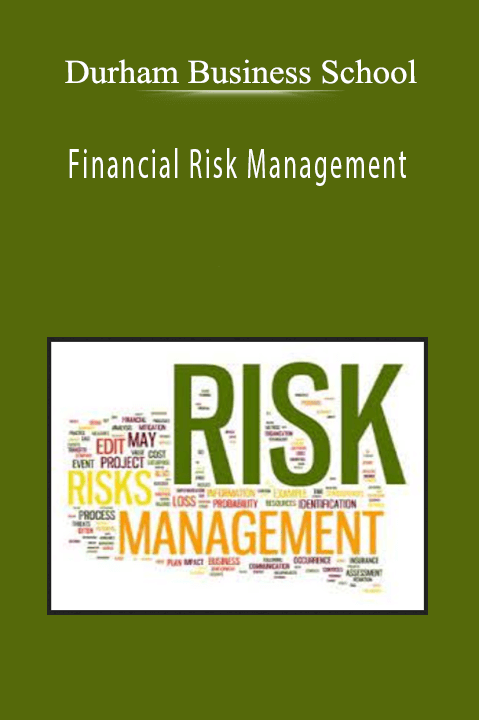
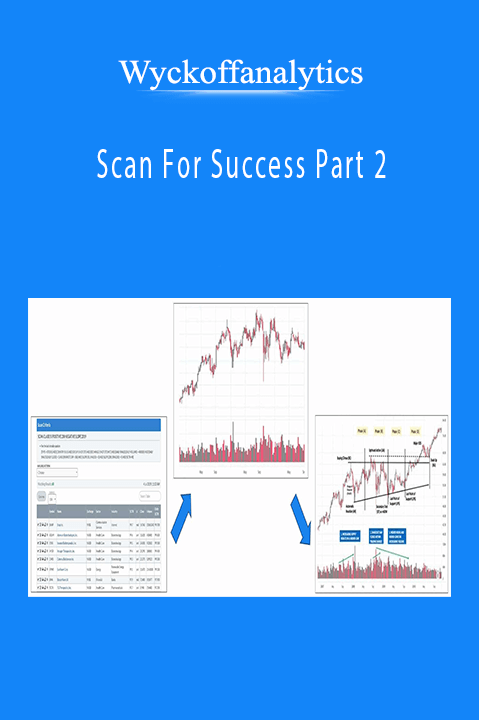

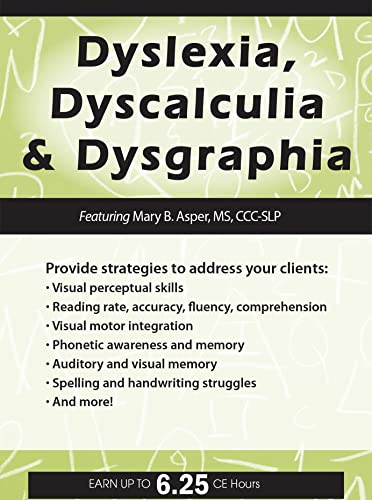
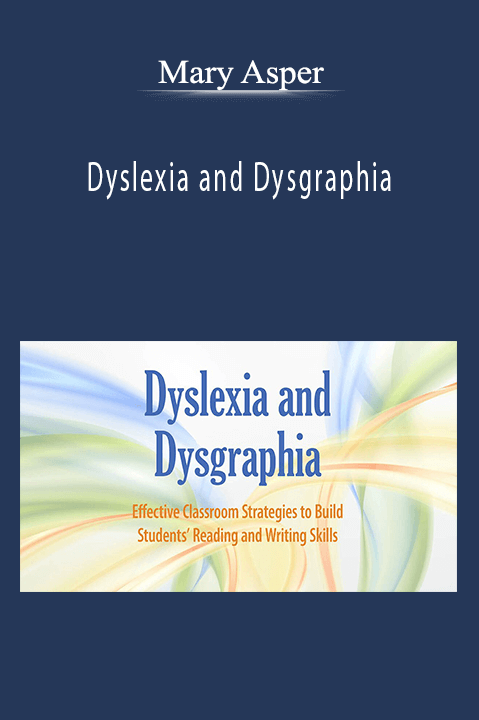
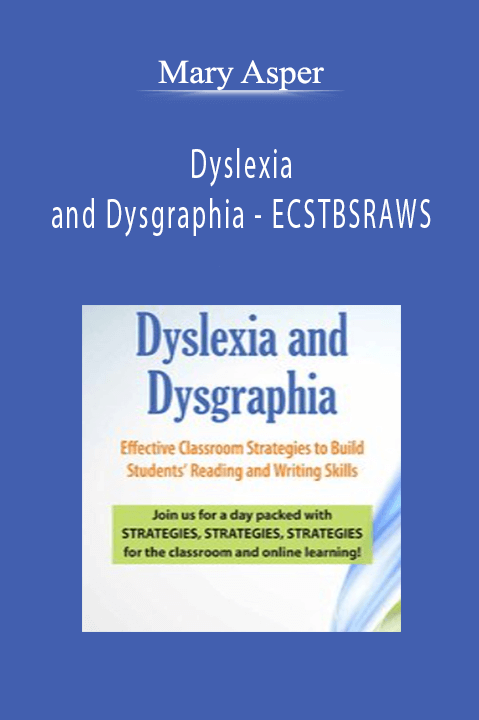
12 reviews for Mary Asper – Dyslexia, Dyscalculia and Dysgraphia
There are no reviews yet.